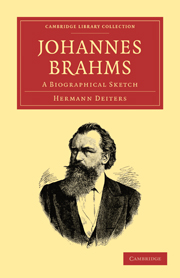BRAHMS' LATER COMPOSITIONS
Published online by Cambridge University Press: 29 August 2010
Summary
It will be seen that the foregoing publication appeared in Germany in 1880; this will explain why Brahms' latest compositions are not dealt with. Since that time upwards of twenty works have been published, which vary considerably in character and importance, but for the most part amply fulfil the magnificent promise of earlier years.
It is not intended to enter here upon a detailed criticism of these works; for any attempt at interpretation or exposition would need a far deeper musical culture and experience than the present writer possesses; but this little book would be incomplete without a short description of them, sufficient to point out their leading characteristics and tendencies.
First of all it is noticeable, in reviewing the works of the last seven years, that during this important period Brahms' style has undergone no very marked change, such as occasionally happens with great composers at their fullest maturity. Time has rather developed and confirmed his earlier characteristics than brought about any revolution in his modes of thought or expression. Though they are written in strict accordance with modern musical principles, these works display no startling innovations, no eccentricities of form or effect. Now, as formerly, Brahms remains distinctly conservative in his tendencies and methods.
He has further enriched and added to every branch of art in which he has been previously successful; but as yet no dramatic work has been even hinted at, and it would be idle to speculate upon the possibility of this new departure.
- Type
- Chapter
- Information
- Johannes BrahmsA Biographical Sketch, pp. 129 - 154Publisher: Cambridge University PressPrint publication year: 2009First published in: 1888



